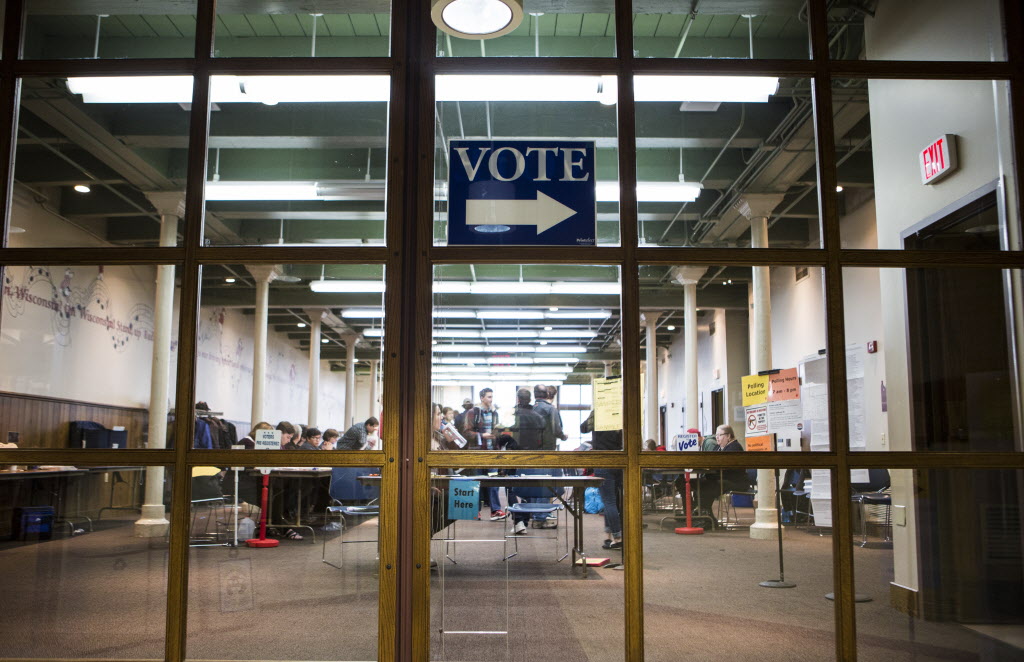Senate Elections Committee members today voted along party lines in favor of a pair of bills dealing with absentee ballots.
Ahead of votes, lawmakers also voted along party lines to add amendments to each bill. Dem Sens. Jeff Smith, D-Eau Claire, and Kelda Roys, D-Madison, voted against a Republican amendment to SB 209 that would require election workers to empty absentee ballot drop boxes by 5 p.m. on election night.
Smith said he is concerned because that deadline conflicts with the 8 p.m. deadline for polls to close.
Sen. Alberta Darling, R-River Hills, said the earlier drop box deadline is intended to help local municipalities process the absentee ballots before they start on regular ballots because those absentee ballots require more processing time and work.
The amendment would also allow a drop box to be on the same premises as the clerk’s office. And it also would allow municipalities with populations of 70,000 or more to authorize the use of an additional three drop boxes on municipal property other than a city park. Those additional drop boxes would have to be under continuous video surveillance.
The original version of the bill would’ve limited clerks to one drop box, regardless of community size.
Committee members also passed along party lines, with Dems opposed, an amendment to SB 211. The amendment would allow voters to submit absentee ballot envelopes with either a written signature or electronic signature. It also changes language in the bill to specifically refer to the WisVote system rather than a more general reference to a voting system.
The bill also would ban clerks from using the envelope for ballots used during early, in-person voting to double as the required written application for an absentee ballot.
Committee Chair Sen. Kathy Bernier, R-Chippewa Falls, said the bills are meant to bring guidance to drop box and absentee ballot use, an area of elections law that she says didn’t exist before the state had to hold elections during a pandemic.
Darling added the bills address election issues raised in the past.
“And we found many irregularities in the past election and others. For instance, drop boxes are not in statute, so we have to ask ourselves, ‘Are they legal or not?'” Darling said. “And so we’re trying to clear up those situations, because we really want us, as policymakers, to be responsible for our statutes related to elections. We want those election statutes to be as uniform and clear as possible, and enforceable.”
Issues addressed in both bills factored into former President Trump’s unsuccessful attempt to overturn Wisconsin’s election results. For example, his lawsuits challenged 170,140 ballots in liberal Dane and Milwaukee counties because the clerks there used an envelope for early in-person ballots that doubled as the written request required under state law.
Lawmakers and local officials praised a pair of bills that would allow election clerks to start canvassing absentee ballots before election night and require election recount workers be paid the same as election workers were paid on election day.
In a public hearing after the committee votes, local officials praised SB 214 because they said it would help municipalities get at least part of the head start on absentee ballot canvassing they have been asking for over the past decade.
City of Milwaukee Intragovernmental Policy Manager Brenda Wood added the need for extra time became blatantly obvious during the November 2020 election. She said their effort to start processing nearly 200,000 ballots on election night was a “monumental undertaking, so any relief that we could get in early canvass time would be most appreciated.”
And Darling voiced her support for SB 268, which would require recount workers be paid the same amount as they would be if they were working a regular election. She said the bill would make sure recount workers don’t get paid more than election workers, something she says was an issue in the last presidential election and its recount.
Rep. Cody Horlacher, R-Mukwonago, agreed with Darling, adding the bill would protect Wisconsin taxpayers from having to pay those workers too much.
The League of Women Voters of Wisconsin’s Andrea Kaminski raised concerns about consolidating the number of polling places in communities under 35,000 people, but committee members said they would likely remove that provision.
Rock County Clerk Lisa Tollefson also raised concerns about the consolidating of polling places because she said it could mean longer drives for voters living in communities with smaller populations spread out over large areas.
Committee members said they would likely remove the provision from the bill because they did not intend the consolidation provision to make it harder for certain voters to cast their ballots.
However, Tollefson said she does support the bill because it helps local clerks deal with the increasing absentee ballot count, it clarifies ballot handling and helps make the absentee voting process easier for voters and clerks.
Kaminski also voiced support for the bill overall.



